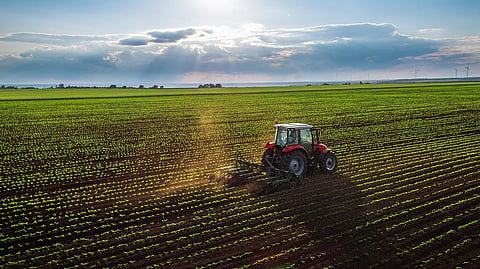

Agricultural automation, which includes anything from tractors to artificial intelligence, play an important role in making food production more efficient and environmentally friendly. But it can also deepen inequalities if it remains inaccessible to small-scale producers and other marginalised groups, said a new report.
The 2022 edition of the State of Food and Agriculture report by the Food and Agriculture Organization (FAO) of the United Nations looked at how automation in our agrifood systems can contribute to achieving sustainable development goals. The report was released November 2, 2022.
It also offered recommendations to policymakers on how to maximise benefits and minimise risks. The available statistics on the number of tractors per 1,000 hectares of arable land highlighted the unequal regional progress towards mechanisation.
High-income countries in North America, Europe and Oceania were highly mechanised by the 1960s. But regions dominated by low-and middle-income countries were less mechanised.
The report looked at 27 case studies from all over the world, representing different technologies. Only 10 of the 27 service providers are profitable and financially sustainable, the report revealed.
These ten providers — mostly based in high-income countries — used solutions that are in the mature phase (widely adopted). These solutions mostly served large-scale producers.
“Crucially, there are wide disparities in the spread of automation between and within countries, with adoption being particularly limited in sub-Saharan Africa,” the report said.
For instance, Japan had more than 400 tractors per 1,000 hectares of arable land, compared with just 0.4 in Ghana in 2005, it added.
Agriculture reliant on human and animal power continues to dominate in sub-Saharan Africa, limiting productivity. Sustainable rental mechanisms are key for aiding mechanisation in these regions, the report noted.
Thousands of individuals across the region own tractors and can provide tractor-hire services to farmers. TROTRO Tractor in Ghana is a case in point.
TROTRO Tractor Limited (TTL) is a platform that connects farmers and tractor operators. It allows tractor owners to monitor their equipment’s movement and operations.
Based on this analysis, the publication suggested policies to ensure that agricultural automation is inclusive and contributes to sustainable and resilient agrifood systems.
The report also addressed concerns about the possible negative impacts of labour-saving technological change in terms of job displacement and unemployment.
Agricultural automation can lead to unemployment in places where rural labour is abundant and wages are low. Policymakers should avoid subsidising automation in such labour-abundant contexts, the report added.
They should focus on creating an enabling environment for adopting automation. Social protection should be provided to the least skilled workers, who are more likely to lose their jobs during the transition, the report noted.
“FAO truly believes that without technological progress and increased productivity, there is no possibility of lifting hundreds of millions of people out of poverty, hunger, food insecurity and malnutrition,” FAO Director-General QU Dongyu wrote in the report’s foreword.
We must ensure that automation takes place in a way that is inclusive and promotes sustainability, Dongyu said.
“What matters is how the process of automation is carried out in practice, not whether or not it happens,” Dongyu added.